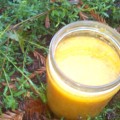
Carrot contains a very complete nutrition to provide our body the essential enzymes, vitamins and minerals. For each 100 gram, the carrot has 7.6 gram of carbohydrate, 0.6 gram of protein, 0.3 gram of fat, 30 milligram of calcium and 0.6 milligram of iron. Also, it is a good source of fiber, vitamin B1, vitamin B2, vitamin B6, vitamin C, vitamin K, biotin, potassium and thiamine.
Carrot also offers an excellence source of beta-carotene, which is 3.62milligram (equivalent to 1981 international unit for the value of vitamin A) in each 100 gram of carrots. Many studies have shown that carrot provide us the highest amount of beta-carotene among the list of vegetables we always consume everyday.
The best thing of carrot is that it is easily assimilated by our body. Chinese practitioners said that carrot tastes sweet, and it is good for the health of spleen and stomach. It is also believed to improve impotence (lower sexual drive), sexual dysfunction, night blindness, long term cough (or call hundred days cough in Chinese medical prescription) besides strengthening kidney and eliminating excessive wind and cold in our body.
Carrot has proved its outstanding role in anti-cancer effect. The research revealed that people with lack of beta-carotene were more likely to have 2 times higher risk of cancer than normal people. It is wiser to eat an appropriate amount of carrot per day to prevent cancer. This is because beta-carotene in the carrot can be easily changed by our body into vitamin A, which is essential for healthy cell growth, strong immune system and protection against mascular degeneration (AMD).
The research also found that carrot contains bulk of folic acid, a group of vitamin B, which has good effect to fight against free radicals (substances that cause cancer) in our body. The lignin found in carrot too, helps to strengthen our immune system to fight against cancerous cells. Potash succinate, its anti hypertensive drug properties may also help to reduce the blood pressure. Therefore, it is also regarded as a good diet for hypertension’s patient.
Arugula is an excellent source of vitamins A and C, folic acid, calcium, manganese, and magnesium. It’s also a very good source of potassium, iron, zinc, riboflavin, and
copper.
Arugula and other cruciferous vegetables contain a group of anticancer compounds known as glucosinolates. These compounds exert antioxidant activity, and are potent stimulators of natural detoxifying enzymes in the body.
Arugula, like other greens, is rich in many essential vitamins and minerals, as well as important phytochemicals. Arugula contains phytochemicals such as carotenes and chlorophyll. Those phytochemicals make it an excellent source of antioxidants.
The health benefits of spinach are numerous and its ability to help prevent disease is well known. Spinach is at the top of many super food lists.
Spinach Nutrition
Spinach and other dark leafy greens like kale, collards, Swiss chard, turnip greens and bok choy are loaded with calcium, folic acid, vitamin K and iron.
Spinach is also rich in vitamin C, fiber and carotenoids. Add its lutein and bioflavanoids and spinach is a nutritional powerhouse.
Spinach nutrition is amazing. The calcium content in spinach and the other dark leafy greens mentioned above strengthens bones.
The A and C vitamins in spinach plus the fiber, folic acid, magnesium and other nutrients help control cancer, especially colon, lung and breast cancers. Folate also lowers the blood levels of something called homocysteine, a protein that damages arteries. So spinach also helps protect against heart disease.
The flavonoids in spinach help protect against age related memory loss.
Spinach’s secret weapon, lutein, makes it one of the best foods in the world to prevent cataracts, as well as age related macular degeneration, the leading cause of preventable blindness in the elderly. Foods rich in lutein are also thought to help prevent cancer.
As you can see, the health benefits of spinach are numerous. The vitamins and calcium in spinach, combined with the overall nutritional value of spinach, make this vegetable and its dark leafy green cousins top picks for healthy food choices.
The health benefits of eating garlic, onions and peppers on a daily basis were well known to our ancestors. They used them to protect themselves from illness and to act as an antiseptic for a wide range of infections.
Modern dietary advice, supported by scientific evidence, emphasizes the benefits of a daily intake of garlic, onions and peppers. These pungent natural foods contain chemicals that can protect the body from so many major and minor illnesses, including:
* Cardiovascular disease
* Infections
* Diabetes
* Respiratory problems * Cancers
Garlic:
Since early civilisation, mankind has used garlic for its powerful healing qualities. Today, there is worldwide scientific evidence to support the many health benefits that can be derived from the daily consumption of garlic.
* Extensive tests on humans have concluded that a regular intake of garlic can:
* Lower total cholesterol (but raise the good-type HDL cholesterol
* Produce more “natural killer” cells in the blood that will tackle infections and tumours
* Lower blood pressure
* Reduce the risk of blood clots (that are responsible for most heart attacks and strokes)
* Destroy infection causing viruses and bacteria
* Reduce the risk of certain cancers, in particular, stomach cancers.
* Garlic is best eaten raw. Cooking can destroy some of the “allicin” compound which is responsible for the powerful healing effects of garlic.
Onions:
Like garlic, onions too, have significant health benefits. For instance, they can:
* Boost good-type HDL cholesterol (particularly when consumed raw)
* Reduce total cholesterol levels
* Increase blood-clot dissolving activity
* Reduce the risks of diabetes
* Attack bacteria that cause infection
* Reduce the risk of certain cancers
Scientific tests have further identified a compound in onions called “quercetin” which is a powerful antioxidant and cancer-attacking agent.
Peppers:
Peppers, along with garlic and onions offer many significant health benefits. Top of the list has to be their healing effect on respiratory problems. Hot peppers have always played an important role in traditional Chinese medicine. They are recognized for their ability to tackle pulmonary and respiratory illnesses. Peppers contain “capsaicin” which helps the lungs function more effectively. In addition, a daily intake of peppers is highly recommended for smokers and even non-smokers.
The health benefits of a daily intake of peppers are well established. Eating peppers can:
* Reduce respiratory illnesses
* Help asthmatics breathe more easily
* Control and often cure sinus and nasal passage problems
* Reduce headaches
* Provide a major source of vitamin C
In conclusion, there is overwhelming evidence to suggest that you can boost your health by eating garlic, onions and peppers, on a regular basis. Work them into your daily diet by eating them raw (ideally) or cooked. Use them as flavouring, crush, mince or chop them and include this powerful trio in as many ordinary, day-to-day recipes as you can. Don’t just think of them as occasional food items to be used for special meals or when entertaining. Instead, for example, add them to burgers, casseroles and salads etc. Let your imagination come up with new ways of incorporating them into your daily diet – ideas that will really suit you and fit in with your family eating preferences.
Whether you plant them or pick them up at the grocery store or farmers’ market, adding fresh herbs is a quick way to transform ORDINARY meals into EXTRAORDINARY meals.
Besides helping flavor foods when cutting back on salt, fat and sugar, herbs may offer additional benefits of their own. Researchers are finding many culinary herbs (both fresh and dried) have antioxidants that may help protect against such diseases as cancer and heart disease.

Cooking with Fresh Herbs
Take some thyme (pun intended!) to cook with fresh herbs. Here are some hints as you explore what’s best for you. Here are some hints as you explore what’s best for you.
When Substituting Fresh Herbs for Dried Herbs
A general guideline when using fresh herbs in a recipe is to use 3 times as much as you would use of a dried herb. When substituting, you’ll often be more successful substituting fresh herbs for dried herbs, rather than the other way around. For example, think potato salad with fresh vs. dried parsley!
When to Pick or Purchase Herbs
Purchase herbs close to the time you plan to use them. When growing herbs in your own garden the ideal time for picking is in the morning after the dew has dried but before the sun gets hot. This helps ensure the best flavor and storage quality.
How to Store Herbs
Fresh herbs can be stored in an open or a perforated plastic bag in your refrigerator crisper drawer for a few days. If you don’t have access to commercial perforated bags, use a sharp object to make several small holes in a regular plastic bag.
To extend the freshness of herbs, snip off the ends of the stems on the diagonal. Place herbs in a tall glass with an inch of water, like cut flowers. Cover them loosely with a plastic bag to allow for air circulation. Place them in the refrigerator and change the water daily. Herbs may last a week or more stored this way. NOTE: The flavor of herbs may diminish the longer they’re stored.
If you have more herbs than you can eat, enjoy herbal bouquets throughout your house. You can use either single herbs, combinations of herbs or you can use the herbs as greenery mixed in with other flowers. To help preserve the aroma and color of your herb bouquets, place them out of direct sunlight.
How to Wash Herbs
Wash herbs when you are ready to use them. Wash smaller amounts of herbs thoroughly under running water. Shake off moisture or spin dry in a salad spinner. Pat off any remaining moisture with clean paper towels.
If you’re washing a larger amount of herbs at one time, treat them as you would salad greens. Place in a clean sink or deep bowl filled with cold water and swish around. Lift from the water and transfer to another bowl so dirt and grit remain in the water. Pour out the water and repeat the washing process in clean water until dirt and grit are gone and the water is clear.
NOTE: If you plan to harvest a large amount of herbs from a home garden, consider washing them down with a hose the day before to help remove any large particles of dirt or grit that might be on the leaves.
To your Health!
“V” Chef Mayra






1 Comment
Chia (324 comments)
September 30, 2009 at 9:46 pmThanks for another informative post about veggies for health. I like to eat raw foods, too.